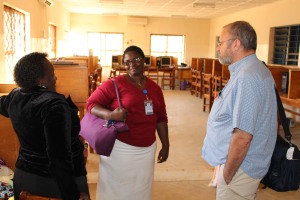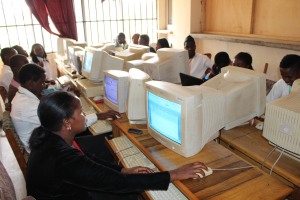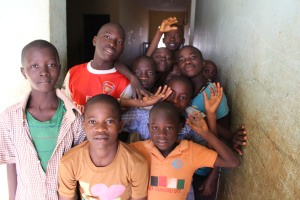I get a kick out of it when the Lord leads us into something, sometimes when we are asking for something else, which seems less and turns out to be more. One of those cases is our use in the Transformational Education Network of the U-shaped classroom.
The West is facing some difficulties as it moves to all-computerized classrooms, which we’ve been doing in Africa since the 1980s. Two of these difficulties are keeping the students on task and getting the students’ attention. Once the students have a computer in front of them, the teacher doesn’t know if they are doing their work or answering email. When the teacher wants to say something or explain something, they have a hard time keeping the students’ attention because their eyes and minds keep going back to the screen.
The West’s solution is more technology: programs that will help you manage or control the students. With this technology, the teacher can watch every student’s screen to make sure they are on task. They can also blank out all the screens to get the students’ attention. There are several problems with this:
- The software takes up part of the budget that could be used for something else that adds learning value;
- It requires a particular infrastructure that reduces the flexibility of the system;
- It fosters the wrong type of character development.
The fostering of the wrong type of character development is the worst of the problems. We are not teaching our students self-control, but that we will control them. The result is that when the teacher is not watching, like when I’m home, I’m going to do whatever I want, even if it is bad for me. Martin Luther King, Jr. once said that the U.S. culture was schizophrenic. That is, people would do opposing things that made no sense and hurt themselves. In the U.S., we call for character development, spending a lot looking for ways to teach it, and yet every day in the classroom we use tools that impede self-control.
The U-shaped class addresses the problems of keeping on task and getting students’ attention. At the same time, it encourages self-control. We designed the U-shaped class so the teacher could easily see all the students’ screens. We also allow for a W shape for a larger class, with a teacher’s assistant watching one group. We did not do this so the teacher could police what the students were doing. We did that so the teacher could easily help the student when they needed it. Besides, in a TEN3 course, the material is designed so that the student doesn’t even think of wasting their time on other things, because they want to learn what is being taught.
When the teacher wants to present something, the students turn in their seats to see the teacher and the board. Hence, the screen is not a deterrent or in the way at all. This is also much more conducive to student discussion than desks placed in rows.
In this case, no longer is the teacher seen as a policeman keeping the students from doing what they want, but as someone who is helping them to develop. There is also a physical move made that enhances the fact that they are giving their students respect. As educators, we know that the more learning categories we can involve in the learning process, the more students we will reach. That is, some students learn better by hearing, others by seeing, others by movement and so forth. There is a real significant difference in a military where physical signs of respect are used, for example a salute, or standing when a superior officer comes in and so forth. That physical sign of respect in still giving the students control of the computers and helps character development far more than if the teacher always controlled them.
There is an adage to “give credit where credit is due.” We are not pretending we thought of this when we decided on the U shape. As we started out, we are thanking the Lord for the ways he has used what we thought were limitations to give us better concepts.
Principle: More technology does not mean better.
Not only is more technology not necessarily better, but if we study technological history, we see that technology often has a detrimental impact on learning. People that purposefully and prayerfully select their technology are the ones that end up the best in the long run.
–Anthony Petrillo, TEN3 President











